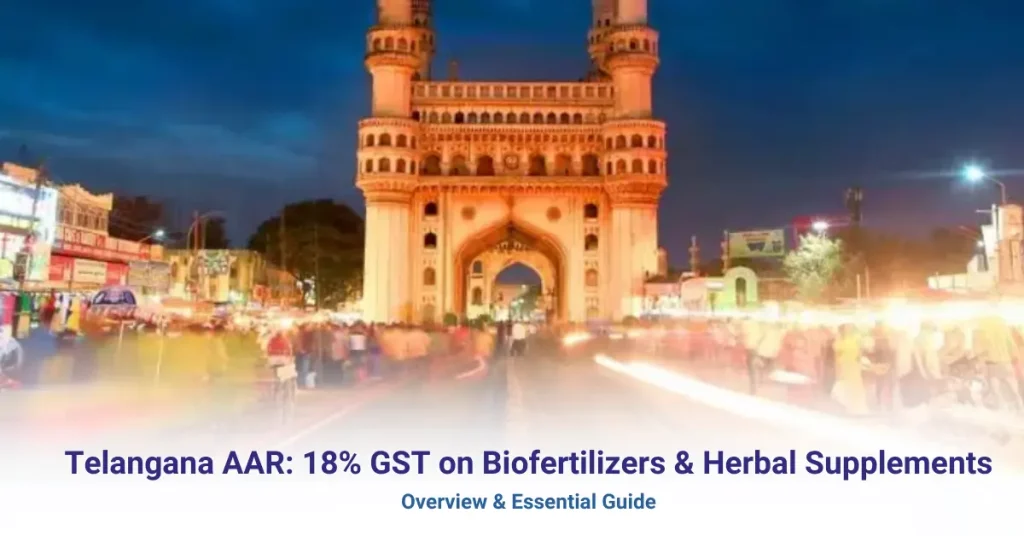In the realm of taxation in India, the Authority of Advance Ruling (AAR) holds significant sway. Recently, in a ruling pertaining to M/s. Avinja Biotechnologies Private Limited, AAR Telangana pronounced that the GST rate of 18% is to be levied on biofertilizers and herbal supplements. This decision has sparked discussions and raised eyebrows in various sectors. AAR serves as a vital body for businesses and individuals seeking clarity on the interpretation and application of tax laws before engaging in transactions or activities. Its rulings not only provide guidance but also carry legal weight, impacting the financial decisions of entities across the country. In this context, the imposition of an 18% GST rate on biofertilizers and herbal supplements by AAR Telangana underscores the importance of understanding and navigating the intricacies of India’s tax regime.
Understanding GST
GST, or Goods and Services Tax, is a unified tax on goods and services in India, introduced to simplify the tax system. Before GST, there were multiple taxes like VAT, excise duty, and service tax, making compliance complex for businesses. GST aims to streamline this by consolidating these taxes into a single tax, reducing the burden on businesses. It helps businesses by making tax calculations simpler and reducing the number of taxes they need to pay, thus improving ease of doing business.
One of the primary reasons why GST matters is because it simplifies the taxation system. Before GST, there were multiple layers of taxes imposed by both the central and state governments, leading to a complex tax structure. GST has unified these taxes into a single tax system, making compliance easier for businesses and reducing the tax burden on consumers.
Another important aspect of GST is its role in promoting economic growth. By eliminating the cascading effect of taxes (tax on tax), GST has made goods and services cheaper, which in turn boosts consumption and investment. This, in the long run, contributes to economic growth and development.
Moreover, GST has also facilitated the ease of doing business in India. With a simplified tax structure and streamlined processes, businesses find it easier to comply with tax regulations, reducing the administrative burden and promoting business expansion.
Businesses can register for GST through the GST portal by filling out the registration form and submitting required documents. Once registered, businesses need to file GST returns regularly, providing details of sales and purchases, and pay the tax due. GST has also improved tax compliance and transparency, as it’s a technology-driven tax system with online processes for registration, filing, and payment.
Overall, GST has had a significant impact on businesses, simplifying tax procedures, reducing compliance costs, and promoting better tax compliance. It has also helped in creating a more unified and transparent tax regime in India, benefiting both businesses and the government.
Also Read: GST Guide – The Complete Information About GST
Telangana AAR and Its Authority

The Telangana Authority of Advance Ruling (Telangana AAR) is a special organization. It’s responsible for giving decisions on tax matters before they happen. For instance, if a company wants to know how much tax they have to pay on a product, they can ask Telangana AAR. Its decisions are important because they provide clarity on tax rules for businesses and individuals. This helps them plan their finances better and avoid any misunderstandings with the tax authorities. Telangana AAR’s authority is recognized by law, making its rulings legally binding for everyone involved.
Biofertilizers: A Green Revolution
Biofertilizers are like special helpers for farmers. They’re natural substances that farmers use to make their crops healthier and stronger. Unlike chemical fertilizers, which can harm the environment, biofertilizers are eco-friendly. They’re made from things like bacteria, fungi, and other living organisms. When farmers use biofertilizers, they’re not just feeding their plants; they’re also feeding the soil, making it richer and more fertile. This is why biofertilizers are often called the “green revolution” in farming. They help farmers grow more food without harming the earth. So, biofertilizers are not only good for the crops but also for the environment, making them an important part of modern agriculture.
Herbal Supplements: Nurturing Health Naturally
Herbal supplements are natural products derived from plants or plant extracts that are taken orally to support health and well-being. They have been used for centuries in traditional medicine systems such as Ayurveda, Traditional Chinese Medicine, and Native American medicine. These supplements come in various forms, including capsules, tablets, powders, teas, and extracts.
The popularity of herbal supplements has surged in recent years due to increasing interest in natural remedies, holistic health practices, and concerns about the potential side effects of synthetic drugs. People often turn to herbal supplements as alternatives or complements to conventional medicine to address various health issues.
One of the key appeals of herbal supplements is their perceived safety and minimal risk of adverse effects compared to pharmaceutical drugs. Since they are derived from natural sources, many people believe that herbal supplements are gentler on the body and less likely to cause harmful reactions. However, it’s essential to note that herbal supplements can still interact with medications and may not be suitable for everyone, so it’s crucial to consult with a healthcare professional before starting any new supplement regimen.
Herbal supplements offer a wide range of potential health benefits, depending on the specific herbs used and their medicinal properties. For example:
- Immune support: Certain herbs like echinacea, elderberry, and astragalus are believed to strengthen the immune system and help the body fight off infections.
- Digestive health: Herbs such as ginger, peppermint, and fennel may aid in digestion, relieve gastrointestinal discomfort, and promote gut health.
- Stress relief and mood support: Adaptogenic herbs like ashwagandha, rhodiola, and holy basil are thought to help the body adapt to stress, support mental clarity, and promote emotional well-being.
- Joint and muscle support: Turmeric, boswellia, and devil’s claw are herbs commonly used to alleviate joint pain and inflammation associated with conditions like arthritis.
- Sleep aid: Herbs like valerian root, chamomile, and passionflower are known for their calming properties and may help improve sleep quality and duration.
- Heart health: Hawthorn, garlic, and olive leaf extract are herbs that may support cardiovascular health by lowering blood pressure, reducing cholesterol levels, and improving circulation.
Despite their potential benefits, it’s essential to approach herbal supplements with caution and skepticism. The quality and potency of herbal supplements can vary widely between brands, and not all products on the market are backed by scientific evidence. Additionally, herbal supplements are not regulated as strictly as pharmaceutical drugs in many countries, which means there may be inconsistencies in product quality, labeling, and safety standards.
The 18% GST Conundrum
Following the aforementioned discussion, the AAR has issued the following rulings regarding the GST rates applicable to Avinja’s products:
- Urban Roots: A tax rate of 9% CGST and 9% SGST is to be levied. This product falls under Serial 453 of Schedule III.
- Bio Kavach: Similarly, a tax rate of 9% CGST and 9% SGST is applicable. This product is covered under Serial 453 of Schedule III.
- Avinja 7 Immunity Booster: The tax rate for this product is determined to be 9% CGST and 9% SGST, falling under Serial 453 of Schedule
- Consequently, the AAR has clarified that despite Avinja’s suggestions for concessional rates, both bio-fertilizers and immunity boosters will attract an effective GST rate of 18%. This ruling establishes a significant precedent for companies operating within similar sectors.
Ruling- For GST Rate
Question 1: The HSN code for Urban Roots is in Serial No 453 of Schedule III of Notification No. 1/2017. The tax rate for it is 9% CGST & 9% SGST.
Question 2: The HSN code for Bio kavach is also in Serial No 453 of Schedule III of Notification No. 1/2017. The tax rate for it is also 9% CGST & 9% SGST.
Question 3: The HSN code for Immunity Booster – Avinja 7 is in Serial No 453 of Schedule III of Notification No. 1/2017. The tax rate for it is also 9% CGST & 9% SGST.
Also Read: How GST Rates Could Impact Your Business Strategy
Conclusion:
In conclusion, the Telangana Authority for Advance Rulings (AAR) has shed light on the complex realm of GST taxation concerning biofertilizers and herbal supplements. Despite the endeavors towards fostering a greener revolution through biofertilizers and nurturing health naturally with herbal supplements, the imposition of an 18% GST presents a significant conundrum. This ruling underscores the need for a nuanced understanding of GST in India, the jurisdictional authority of bodies like the Telangana AAR, and the implications for sectors pivotal to sustainable agriculture and holistic healthcare. As stakeholders navigate through these regulatory landscapes, it becomes imperative to advocate for clarity and coherence in GST policies to facilitate the growth of environmentally friendly practices and the promotion of wellness through herbal supplements, thereby contributing to a healthier and more sustainable future for all.
Also Read: GST Calculator Online – Simplify Your Daily Finances And Taxes
Also Listen: GSTR Filing Process with CaptainBiz – Tutorials
FAQ’s
-
What is the Authority of Advance Ruling (AAR) in India, and why is it significant?
The AAR provides rulings on tax matters before transactions occur, offering clarity on tax rules for businesses and individuals. Its decisions are legally binding and crucial for financial planning and compliance.
-
What recent ruling did the AAR Telangana make regarding GST rates for biofertilizers and herbal supplements?
- The AAR Telangana pronounced an 18% GST rate for biofertilizers and herbal supplements, sparking discussions in various sectors.
-
What is the purpose of GST in India, and how does it simplify taxation?
- GST is a unified tax on goods and services, aimed at simplifying the tax system by consolidating multiple taxes into a single tax, reducing the burden on businesses and improving ease of doing business.
-
What are the benefits of GST, and how does it promote economic growth?
- GST simplifies tax procedures, reduces compliance costs, and promotes better tax compliance. By eliminating the cascading effect of taxes, it makes goods and services cheaper, boosting consumption and investment, thus contributing to economic growth.
-
What role does the Telangana AAR play in taxation matters, and why are its rulings important?
- The Telangana AAR provides clarity on tax rules before transactions occur, helping businesses and individuals plan their finances and avoid misunderstandings with tax authorities. Its rulings are legally binding and recognized by law.
-
What are biofertilizers, and why are they considered important in modern agriculture?
- Biofertilizers are natural substances that improve soil fertility and crop health without harming the environment. They are crucial for sustainable agriculture as they promote soil health and reduce the reliance on chemical fertilizers.
-
What are herbal supplements, and why have they gained popularity in recent years?
- Herbal supplements are natural products derived from plants, used to support health and well-being. They have gained popularity due to increasing interest in natural remedies, holistic health practices, and concerns about the side effects of synthetic drugs.
-
What GST rates did the AAR specify for specific products of Avinja Biotechnologies Private Limited?
- The AAR specified a GST rate of 9% CGST and 9% SGST for products like Urban Roots, Bio Kavach, and Avinja 7 Immunity Booster, falling under Serial No 453 of Schedule III of Notification No. 1/2017.
-
Why is the imposition of an 18% GST rate on biofertilizers and herbal supplements considered a conundrum?
- Despite efforts towards sustainable agriculture and holistic healthcare, the 18% GST rate poses challenges. It underscores the need for nuanced understanding of GST policies and implications for sectors promoting environmental practices and wellness.
-
What are the key takeaways from the AAR’s ruling regarding GST rates for biofertilizers and herbal supplements?
- The ruling highlights the importance of clarity and coherence in GST policies, especially for sectors pivotal to sustainable agriculture and holistic healthcare, aiming for a healthier and more sustainable future.

